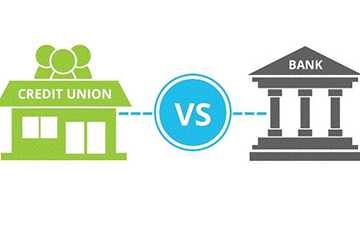When to Consider a Credit Union Over a Traditional Bank
Electing an optimal domicile for the stewardship of one's financial resources represents a consequential decision. Choosing between a credit union and a bank hinges on many intricate considerations. This article will explore the disparities between credit unions and banks, helping you decide when opting for a credit union might be more beneficial for your requirements.

What is a Credit Union?
A credit union represents a syndicate of fiduciary conglomerates structured as a cooperative entity and held in collective stewardship by its constituent members. These unions are orchestrated as non-pecuniary entities, centralizing their operations to provide bespoke financial services to their cohort rather than accruing capital gains.
Key Disparities: Credit Union vs Bank
When contrasting a credit union with a banking institution, one must discern their intrinsic disparities:
Proprietorship: Credit unions are owned cooperatively by their constituents, while banking establishments are owned solely by shareholders.
- Profit Motive: Banks aim to generate profits for their shareholders, whereas credit unions strive to provide benefits to their members.
- Fiscal Obligations and Usury Metrics:
Customarily, fiduciary assemblages known as credit unions present a more benevolent financial structure for their constituents, manifesting through minimized fiscal exactions.
Opting for a Credit Union
When contemplating the advantages of credit unions, there are particular circumstances wherein choosing a credit union may prove to be more advantageous:
Pursuing diminution in charges and augmentation in rates
If one seeks mitigation in charges for their accounts or enhancement in the interest rates about loans and savings, choosing a credit union may be more favourable. Credit unions' intrinsically diminished operational expenditures frequently precipitate more favourable fiscal conditions for their constituents.
Evaluating Bespoke Clientele Engagement
For connoisseurs of customized client service, electing a credit union over a bank can furnish a more gratifying financial intermediation experience. Credit unions customarily espouse a client-centric ethos compared to the modus operandi of voluminous, established banking conglomerates.
Advocating for Communal Solidarity
Should the endorsement of proximal communal endeavours resonate with your principles, a credit union might more aptly harmonize with your ethos. Numerous credit unions are ardently engaged in and bolster local societal functions and philanthropies.
Benefits of Credit Unions
There are myriad benefits to choosing a credit union over a traditional bank. Herein are some of the quintessential benefits of credit unions:
Fee Alleviation
Generally, credit cooperatives levy minimal pecuniary impositions vis-à-vis their banking counterparts. They may offer free checking accounts, reduced overdraft fees, and lower charges for other services.
Supreme Interest Remuneration
Credit unions frequently offer unparalleled interest rates on savings accounts and loans due to their non-profit status, allowing them to pass on savings to their members.
Personalized Service
Choosing a credit union offers more personalized service. Their member-focused approach often results in higher customer care, with staff taking the time to understand individual member needs.
Community Focus
Numerous credit unions tend toward community-centric endeavours, frequently disseminating fiscal enlightenment and fortifying indigenous undertakings. This community focus can foster a sense of connection and value among members.
Potential Detriments of Credit Unions
While credit unions have numerous advantages, potential adversities must be meticulously contemplated when compared to a financial institution.
Constrained Accessibility
Credit unions may need more branches and automated teller machines (ATMs) compared to their sizable banking counterparts; this can be inconvenient if you travel frequently or prefer in-person banking services.
Admittance Qualification Parameters
Among other benefits of credit unions, they frequently delineate exclusive membership eligibility requisites contingent upon diverse factors such as geographic provenance, professional engagement, or affiliation with specific associative entities, incorporating intricate determinants like socio-demographic indicators, nuanced occupational classifications and proprietary membership allocations derived from bespoke demographic stratifications.
How to Choose Between a Credit Union and a Bank
When deciding between a credit union and a bank, consider the following steps:
1. Assess Your Needs: Determine what you value most in a financial institution—low fees, competitive interest rates, personalized service, or robust digital banking features.
2. Compare Options: Evaluate the services, fees, and interest rates credit unions and banks offer. Consider what each institution can offer based on your financial needs.

3. Visit and Inquire: Visit local credit unions and banks, ask questions about their services and see if you feel comfortable with their customer service.
4. Check Membership Requirements: For credit unions, ensure you meet the membership criteria and understand what’s required to join.
Credit Unions: Facilitating Microenterprises
Microenterprise Financing
Credit unions frequently offer financial instruments tailored specifically for microenterprises. These products typically provide diminished interest rates and enhanced flexibility compared to conventional banking institutions.
Commercial Banking Services
Credit unions offer various commercial banking services, including business transactional and savings accounts, with reduced charges and augmented interest rates. They also furnish business credit facilities endowed with favourable conditions.
Community Engagement
Choosing a credit union confers upon small enterprise proprietors the advantage of the establishment's extensive bonds within the local community, frequently culminating in heightened networking prospects and local patronage.
Technological Advancements in Credit Unions
Mobile Banking
- Check Balances: Quickly view account balances and recent transactions.
- Deposit Checks: Deposit checks remotely using a smartphone.
- Transfer Funds: Easily transfer money between accounts or to other members.
Online Services
- Bill Pay: Conveniently pay bills online without needing checks or stamps.
- Loan Applications: Apply for personal or business loans online with simplified application processes.
- Account Management: Manage multiple accounts from a single online dashboard.
Credit Unions: Catalysts for Community Empowerment
Among other benefits of credit unions, they often have a profound impact on their local communities through various initiatives:
Financial Education Programs
- Budgeting: Helping individuals and families manage their finances effectively.
- Homeownership: Guiding, purchasing, and maintaining a home.
- Retirement Planning: Offering strategies for saving and investing for retirement.
Charitable Giving
- Donations: Monetary contributions to local charities.
- Volunteerism: Encouraging employees and members to volunteer their time.
- Sponsorships: Supporting local events and initiatives through sponsorship.
Conclusion
Both credit unions and traditional banks have their unique advantages and disadvantages. Grasping these distinctions can facilitate your discernment of when electing a credit union may be the prudent course for you. Whether you prioritize diminished levies, superior interest rates, bespoke assistance, or communal engagement, credit unions can proffer noteworthy advantages that resonate with your fiscal difficulties. Carefully evaluating your options will ensure you make the best decision for managing your finances.





